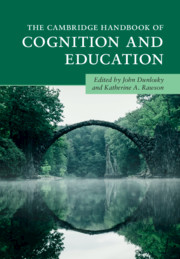Book contents
- The Cambridge Handbook of Cognition and Education
- The Cambridge Handbook of Cognition and Education
- Copyright page
- Contents
- Figures
- Tables
- Contributors
- How Cognitive Psychology Can Inform Evidence-Based Education Reform
- Part I Foundations
- Part II Science and Math
- Part III Reading and Writing
- Part IV General Learning Strategies
- Part V Metacognition
- Index
- References
How Cognitive Psychology Can Inform Evidence-Based Education Reform
An Overview of The Cambridge Handbook of Cognition and Education
Published online by Cambridge University Press: 08 February 2019
- The Cambridge Handbook of Cognition and Education
- The Cambridge Handbook of Cognition and Education
- Copyright page
- Contents
- Figures
- Tables
- Contributors
- How Cognitive Psychology Can Inform Evidence-Based Education Reform
- Part I Foundations
- Part II Science and Math
- Part III Reading and Writing
- Part IV General Learning Strategies
- Part V Metacognition
- Index
- References
Summary
- Type
- Chapter
- Information
- The Cambridge Handbook of Cognition and Education , pp. 1 - 14Publisher: Cambridge University PressPrint publication year: 2019
References
- 6
- Cited by



